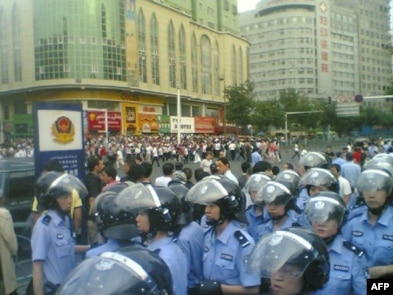Chinese residents protested deteriorating public safety Thursday after reported syringe attacks in the western Chinese city of Urumqi where ethnic rioting in July killed nearly 200 people.
| People living near the city center reached by telephone said hundreds, possibly thousands, of members of China’s majority Han ethnic group gathered downtown to denounce the regional government and deteriorating law and order in the city of 2.5 million.
Despite official claims of calm returning, safety fears have remained high since the July 5 riots among members of the region’s main Uighur ethnic group who targeted Han, residents said. Renewed unrest in Urumqi and the vast surrounding region of Xinjiang could pose a vexing problem for China’s leadership now engaged in an all-out campaign to ensure stability ahead of the 60th anniversary of the founding of the communist state on Oct. 1. Han resident Zhao Jianzhuang said he joined a large crowd of protesters at a downtown intersection who were being blocked by riot police from marching on central People’s Square, less than 1 mile (1.6 kilometers) away. He said people were pushing and shoving police and some in the crowd had been beaten. Participants were shouting slogans including “The government is useless,” and calling for the dismissal of the regional Communist Party boss Wang Lequan, a noted hard-liner and ally of President Hu Jintao. The official Xinhua News Agency confirmed the protest. People assembled at several places, including more than 1,000 in the residential area of Xiaoximen, to demand a “security guarantee” from authorities after a series of syringe attacks were reported in city, it said. Police seized 15 suspects for attacking people with hypodermic needles in the city, Xinhua said. No reason was given for the attacks. A Uighur woman who runs a shop near the Grand Bazaar in the Uighur district described the atmosphere as tense. She said there were few people on the street by mid-afternoon. “Earlier, a lot of people ran over saying ‘something’s happened, something’s happened,’ so I quickly closed my shop and rushed home,” said the shopkeeper, who did not want to give her name for fear of government reprisals. Foreign Ministry spokeswoman Jiang Yu said she had no knowledge of the protest, but told reporters at a regularly scheduled news conference that China’s government “is competent to safeguard social stability and national unity.” Thursday is the 15th day of the seventh lunar month — an important day when Han Chinese honor the dead by inviting them back for meals. The date may have been cause for agitation as most of the victims in the July violence were Han Chinese. Zhao said anger was stoked by a perceived delay in trials for those arrested over the riot, as well as a recent spate of stabbings by people wielding syringes. He claimed more than 460 people had been injured. “There are so many security forces deployed here, yet they’re incapable of protecting us,” Zhao said. Xinhua gave no information about when the stabbings occurred or the number of victims, but quoted a deputy director of the region’s health department as saying nobody had been infected or poisoned and medical workers were conducting regular follow-up checks. The July riots — China’s worst ethnic violence in decades — killed 197 people, injured 1,700 more and sparked a massive security crackdown in the traditionally Muslim western region of Xinjiang, of which Urumqi is the capital. The protest also comes a day after an international trade fair opened in Urumqi, with the government trumpeting the area for foreign investment. “It is safe for foreign businesspeople to invest in Xinjiang. They should not have safety concerns,” He Yiming, the regional commerce department head, was quoted as saying by the state-owned China Daily newspaper on Wednesday. On a visit to Xinjiang late last month, Hu called for the strengthening of ethnic unity and Xinjiang’s local economy. China claims the July riot was instigated by exiled Uighur activist Rebiya Kadeer, an accusation she strongly denies. Uighurs have long complained of discrimination and economic marginalization by Han migrants who have flooded into Xinjiang since communist troops entered the region in 1949. Like Tibetans, another restive minority, many Uighurs claim they were independent for much of their history. The July unrest broke out after police stopped an initially peaceful protest by Uighur youths, prompting crowds to smash windows, burn cars and attack Han Chinese. Two days later, Han vigilantes carried out revenge attacks. |
||
|
|
||
|
||
|
AP BEIJING TodaysZaman
|
||






